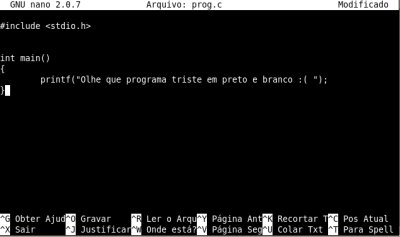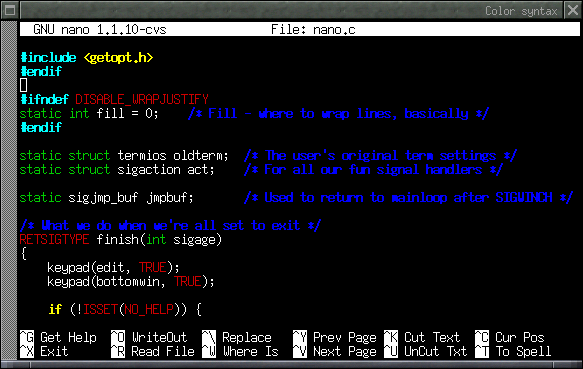Essa dica é para deixa os apaixonados por programação via terminal a dar mais cor a seus códigos.

Resolvi postar esta dica, que vale para os não-apaixonadas pelo Vi, pois estes entendem que são muito complicados aqueles comandos para saltar linha, identar código e outros mais. Só eu sei o que sofri quando meu professor de ensino técnico, no ano de 2009, achou que seria a hora da turma aprender Linux e lá fomos nós aprender “Vi” com uma apostila de 2 páginas e apenas com os principais comandos do editor. Pois é, que tempo bom que não volta nunca mais, ainda bem!
O legal do Vi no Red Hat 7 é que ele já era todo colorido como o próprio console do Linux e eu acha isso o máximo, pois para quem só conhecia o DOS e estava acostumado a ver aquela tela preta com letras brancas, ficou mais divertido. Pois bem, após algum tempo conheci um editor chamado Vim, que para mim já era um Vi melhorado no quesito simplicidade. Contudo, só encontrei algo ainda mais simples no editor Nano, que mais parece um bloco de notas em modo texto. O problema é que ele vem em preto e branco igual a um bloco de notas, então por que não adicionar cores a ele? Então vamos lá, edite o arquivo
- Código: Selecionar todos
nano /etc/nanorc/
e abaixo de onde está marcado Color Setup descomente* todas as linhas onde está escrito
#include e que estão relacionadas ao tipo de código de linguagem que você gostaria de ver suas sintaxes coloridas enquanto utiliza o Nano.
Um exemplo retirado de uma parte do código do arquivo
/etc/nanorc, bem mastigado:
- Código: Selecionar todos
## Nanorc files
# include “/usr/share/nano/nanorc.nanorc”
## C/C++
include “/usr/share/nano/c.nanorc
Repare que apenas esta linha está descomentada, isso quer dizer que os códigos em C e C++ estarão coloridos quando eu estiver utilizando-os no Nano.
- Código: Selecionar todos
## HTML
include “/usr/share/nano/html.nanorc”
## TeX
# include “/usr/share/nano/tex.nanorc”
## Quoted emails (under e.g. mutt)
# include “/usr/share/nano/mutt.nanorc”
## Patch files
# include “/usr/share/nano/patch.nanorc”
Abaixo está o editor com um código em c antes de termos descomentado qualquer linha:
Editor Nano em preto e Branco

Abaixo está o editor com um código em C e já colorido

Espero que gostem eu vou deixar o meu arquivo
nanorc já configurado aqui eu desmarquei todas as linhas para varias linguagens mais ai fica com de vocês.
- Código: Selecionar todos
## Sample initialization file for GNU nano.
##
## Please note that you must have configured nano with --enable-nanorc
## for this file to be read! Also note that this file should not be in
## DOS or Mac format, and that characters specially interpreted by the
## shell should not be escaped here.
##
## To make sure a value is disabled, use "unset <option>".
##
## For the options that take parameters, the default value is given.
## Other options are unset by default.
##
## Quotes inside string parameters don't have to be escaped with
## backslashes. The last double quote in the string will be treated as
## its end. For example, for the "brackets" option, ""')>]}" will match
## ", ', ), >, ], and }.
## Use auto-indentation.
# set autoindent
## Backup files to filename~.
# set backup
## The directory to put unique backup files in.
# set backupdir ""
## Do backwards searches by default.
# set backwards
## Use bold text instead of reverse video text.
# set boldtext
## The characters treated as closing brackets when justifying
## paragraphs. They cannot contain blank characters. Only closing
## punctuation, optionally followed by closing brackets, can end
## sentences.
##
# set brackets ""')>]}"
## Do case sensitive searches by default.
# set casesensitive
## Constantly display the cursor position in the statusbar. Note that
## this overrides "quickblank".
# set const
## Use cut to end of line by default.
# set cut
## Set the line length for wrapping text and justifying paragraphs.
## If fill is 0 or less, the line length will be the screen width less
## this number.
##
# set fill -8
## Enable ~/.nano_history for saving and reading search/replace strings.
# set historylog
## The opening and closing brackets that can be found by bracket
## searches. They cannot contain blank characters. The former set must
## come before the latter set, and both must be in the same order.
##
# set matchbrackets "(<[{)>]}"
## Use the blank line below the titlebar as extra editing space.
# set morespace
## Enable mouse support, if available for your system. When enabled,
## mouse clicks can be used to place the cursor, set the mark (with a
## double click), and execute shortcuts. The mouse will work in the X
## Window System, and on the console when gpm is running.
##
# set mouse
## Allow multiple file buffers (inserting a file will put it into a
## separate buffer). You must have configured with --enable-multibuffer
## for this to work.
##
# set multibuffer
## Don't convert files from DOS/Mac format.
# set noconvert
## Don't follow symlinks when writing files.
# set nofollow
## Don't display the helpful shortcut lists at the bottom of the screen.
# set nohelp
## Don't add newlines to the ends of files.
# set nonewlines
## Don't wrap text at all.
# set nowrap
## Set operating directory. nano will not read or write files outside
## this directory and its subdirectories. Also, the current directory
## is changed to here, so any files are inserted from this dir. A blank
## string means the operating directory feature is turned off.
##
# set operatingdir ""
## Preserve the XON and XOFF keys (^Q and ^S).
# set preserve
## The characters treated as closing punctuation when justifying
## paragraphs. They cannot contain blank characters. Only closing
## punctuation, optionally followed by closing brackets, can end
## sentences.
##
# set punct "!.?"
## Do quick statusbar blanking. Statusbar messages will disappear after
## 1 keystroke instead of 26. Note that "const" overrides this.
##
# set quickblank
## The email-quote string, used to justify email-quoted paragraphs.
## This is an extended regular expression if your system supports them,
## otherwise a literal string. Default:
# set quotestr "^([ ]*[#:>\|}])+"
## if you have extended regular expression support, otherwise:
# set quotestr "> "
## Fix Backspace/Delete confusion problem.
# set rebinddelete
## Fix numeric keypad key confusion problem.
# set rebindkeypad
## Do extended regular expression searches by default.
# set regexp
## Make the Home key smarter. When Home is pressed anywhere but at the
## very beginning of non-whitespace characters on a line, the cursor
## will jump to that beginning (either forwards or backwards). If the
## cursor is already at that position, it will jump to the true
## beginning of the line.
# set smarthome
## Use smooth scrolling as the default.
# set smooth
## Enable soft line wrapping (AKA full line display).
# set softwrap
## Use this spelling checker instead of the internal one. This option
## does not properly have a default value.
##
# set speller "aspell -x -c"
## Allow nano to be suspended.
# set suspend
## Use this tab size instead of the default; it must be greater than 0.
# set tabsize 8
## Convert typed tabs to spaces.
# set tabstospaces
## Save automatically on exit, don't prompt.
# set tempfile
## Enable the new (EXPERIMENTAL) generic undo code, not just for line
## cuts.
# set undo
## Disallow file modification. Why would you want this in an rcfile? ;)
# set view
## The two single-column characters used to display the first characters
## of tabs and spaces. 187 in ISO 8859-1 (0000BB in Unicode) and 183 in
## ISO-8859-1 (0000B7 in Unicode) seem to be good values for these.
# set whitespace " "
## Detect word boundaries more accurately by treating punctuation
## characters as parts of words.
# set wordbounds
## Color setup
##
## Format:
##
## syntax "short description" ["filename regex" ...]
##
## The "none" syntax is reserved; specifying it on the command line is
## the same as not having a syntax at all. The "default" syntax is
## special: it takes no filename regexes, and applies to files that
## don't match any other syntax's filename regexes.
##
## color foreground,background "regex" ["regex"...]
## or
## icolor foreground,background "regex" ["regex"...]
##
## "color" will do case sensitive matches, while "icolor" will do case
## insensitive matches.
##
## Valid colors: white, black, red, blue, green, yellow, magenta, cyan.
## For foreground colors, you may use the prefix "bright" to get a
## stronger highlight.
##
## To use multi-line regexes, use the start="regex" end="regex"
## [start="regex" end="regex"...] format.
##
## If your system supports transparency, not specifying a background
## color will use a transparent color. If you don't want this, be sure
## to set the background color to black or white.
##
## If you wish, you may put your syntaxes in separate files. You can
## make use of such files (which can only include "syntax", "color", and
## "icolor" commands) as follows:
##
## include "/path/to/syntax_file.nanorc"
##
## Unless otherwise noted, the name of the syntax file (without the
## ".nanorc" extension) should be the same as the "short description"
## name inside that file. These names are kept fairly short to make
## them easier to remember and faster to type using nano's -Y option.
##
## All regexes should be extended regular expressions.
## Key bindings
## Please see nanorc(5) for more details on this
##
## Here are some samples to get you going
##
# bind M-W nowrap main
# bind M-A casesens search
# bind ^S research main
## Set this if your backspace key sends delete most of the time (2.1.3+)
# bind kdel backspace all
## Nanorc files
include "/usr/share/nano/nanorc.nanorc"
## C/C++
include "/usr/share/nano/c.nanorc"
## Makefiles
include "/usr/share/nano/makefile.nanorc"
## Cascading Style Sheets
include "/usr/share/nano/css.nanorc"
## Debian files
include "/usr/share/nano/debian.nanorc"
## Gentoo files
include "/usr/share/nano/gentoo.nanorc"
## HTML
include "/usr/share/nano/html.nanorc"
## PHP
include "/usr/share/nano/php.nanorc"
## TCL
include "/usr/share/nano/tcl.nanorc"
## TeX
include "/usr/share/nano/tex.nanorc"
## Quoted emails (under e.g. mutt)
include "/usr/share/nano/mutt.nanorc"
## Patch files
include "/usr/share/nano/patch.nanorc"
## Manpages
include "/usr/share/nano/man.nanorc"
## Groff
include "/usr/share/nano/groff.nanorc"
## Perl
include "/usr/share/nano/perl.nanorc"
## Python
include "/usr/share/nano/python.nanorc"
## Ruby
include "/usr/share/nano/ruby.nanorc"
## Java
include "/usr/share/nano/java.nanorc"
## Fortran
include "/usr/share/nano/fortran.nanorc"
## Objective-C
include "/usr/share/nano/objc.nanorc"
## OCaml
include "/usr/share/nano/ocaml.nanorc"
## AWK
include "/usr/share/nano/awk.nanorc"
## Assembler
include "/usr/share/nano/asm.nanorc"
## Bourne shell scripts
include "/usr/share/nano/sh.nanorc"
## POV-Ray
include "/usr/share/nano/pov.nanorc"
## XML-type files
include "/usr/share/nano/xml.nanorc"
ReferênciaOs créditos por este texto são para josh.
Mudanças- josh, 21/03/2013, correções pontuais.
- Holmes, 20/04/2013, ajustes do texto.
Conteúdo distribuído sob a licença GNU FDL






